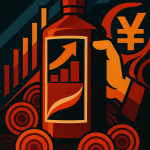Key Points
- “小作文” (xiǎo zuòwén – small essays) are short, often emotional social media posts, sometimes using fake “真凭实据” (zhēnpíng shí jù – real evidence), frequently used in “商战” (shāngzhàn – commercial warfare).
- Chinese authorities are using “大数据” (dàshùjù – big data) to trace the creators and spreaders of misleading “small essays.”
- Social media platforms are increasing scrutiny of “AI生成内容” (AI shēngchéng nèiróng – AI-generated content) and banning rumor-spreading accounts.
- A significant development is the potential for criminal prosecution for fabricated “小作文” (xiǎo zuòwén) that constitute a crime.
- The core message is “假的真不了” (jiǎ de zhēn bùliǎo – Fakes Cannot Become Real), emphasizing that authenticity and integrity are crucial for long-term success online.

Ever stumbled upon those explosive chat screenshots claiming “latest inside information from department ‘X'”? Or maybe a super long “rights defense” article detailing a personal horror story with a company? These are prime examples of what’s known in China as “小作文” (xiǎo zuòwén – small essays) – short, punchy, often narrative or opinion-heavy posts that can absolutely dominate social platforms, especially when they come with what looks like “真凭实据” (zhēnpíng shí jù – real evidence) like “现场视频” (xiànchǎng shìpín – on-site videos) that seem to be suppressed. The real kicker? While you’re emotionally investing, you might just be a pawn in a larger game of “商战” (shāngzhàn – commercial warfare). But the landscape is shifting, and the repercussions for faking these narratives are getting serious, making understanding the truth behind social media “small essays” more critical than ever.
What Exactly Are These “Small Essays” and Why Are They So Potent?
Think of “小作文” (xiǎo zuòwén) as the digital equivalent of a highly persuasive, often emotionally charged, short story or op-ed. They’re designed to:
- Grab your attention fast.
- Evoke strong emotional responses.
- Spread like wildfire, often because they tap into existing grievances or suspicions.
They often appear with compelling, albeit sometimes misleading or entirely fabricated, “evidence.” This could be anything from:
- Selective chat logs.
- Dramatic personal testimonies.
- Edited videos or images.
The troubling reality is that many of these “small essays” aren’t organic outpourings of truth but are instead calculated moves in fierce “商战” (shāngzhàn – commercial warfare). Companies or individuals might use them to:
- Smear competitors.
- Manipulate public opinion.
- Influence stock prices.
- Distract from their own shortcomings.

Find Top Talent on China's Leading Networks
- Post Across China's Job Sites from $299 / role
- Qualified Applicant Bundles
- One Central Candidate Hub
Your First Job Post Use Checkout Code 'Fresh20'

The Crackdown: China Takes Aim at Misleading “Small Essays”
The wild west days of unchecked “小作文” (xiǎo zuòwén) might be numbered. Regulatory authorities are seriously stepping up their game to combat the chaos. Here’s how:
1. Leveraging “大数据” (dàshùjù – Big Data) to Unmask Rumor Creators
Forget hiding behind anonymous accounts. Chinese regulatory bodies are increasingly using sophisticated “大数据” (dàshùjù – big data) analytics to trace the origins of misinformation campaigns and identify the individuals or groups responsible for creating and spreading these harmful narratives. This data-driven approach means a higher chance of accountability.
Insight: China’s investment in big data infrastructure is massive. This allows authorities to sift through vast amounts of online information, making it harder for coordinated inauthentic behavior to go unnoticed. The sheer scale of platforms like WeChat (Weixin 微信) and Weibo (微博) generates an enormous data footprint, which can be a double-edged sword – enabling both widespread communication and sophisticated monitoring.
2. Platforms Under Pressure: AI Content Scrutiny & Account Bans
Social media platforms themselves are now under immense pressure to clean up their act. This involves:
- Beefed-up Review of “AI生成内容” (AI shēngchéng nèiróng – AI-generated content): With the rise of AI tools that can create convincing fake text, images, and even videos, platforms are strengthening their mechanisms to detect and flag AI-generated content, especially when it’s used maliciously within “small essays.”
- Banning Rumor-Spreading Accounts: Repeat offenders and accounts identified as primary nodes in disinformation networks are facing stricter enforcement, including permanent bans.
Food for thought: The challenge with “AI生成内容” (AI shēngchéng nèiróng) is its rapid evolution. As AI gets better at creating realistic fakes, detection methods need to constantly adapt. This creates an ongoing cat-and-mouse game between those creating synthetic media and those trying to police it.
3. The Game Changer: Criminal Prosecution for “Small Essays”
This is where things get *really* serious. It’s not just about fines or a slap on the wrist anymore. Fabricated “小作文” (xiǎo zuòwén – small essays) that are deemed to constitute a crime can now lead to criminal prosecution. This marks a significant escalation in the legal consequences for spreading misinformation and malicious narratives online.
Why this matters: The threat of criminal charges elevates the risk associated with creating and disseminating false “small essays” exponentially. It sends a clear message that manipulating public discourse for commercial or personal gain through deceit has severe real-world consequences beyond reputational damage or platform sanctions.

ExpatInvest China
Grow Your RMB in China:
- Invest Your RMB Locally
- Buy & Sell Online in CN¥
- No Lock-In Periods
- English Service & Data
- Start with Only ¥1,000

- Increased use of “Big Data” for tracing origins.
- Social media platforms enhancing “AI-generated content” scrutiny.
- Platforms implementing stricter rumor-spreading account bans.
- Potential for criminal prosecution in cases where “small essays” constitute a crime.
The Unshakeable Truth: “假的真不了” (jiǎ de zhēn bùliǎo – Fakes Cannot Become Real)
No matter how convincing or emotionally captivating a “小作文” (xiǎo zuòwén) might seem, if it’s built on lies, it’s ultimately a house of cards. Fabricated narratives might generate a quick burst of attention – that fleeting, false traffic – but they rarely stand the test of time or scrutiny.
The core message for businesses, influencers, and anyone operating in the digital space is clear: to build something lasting and reputable in the market, you have to operate with integrity. It’s about “真心换真心” (zhēnxīn huàn zhēnxīn – true heart for true heart, or sincerity for sincerity). Authentic engagement and genuine value will always outperform manufactured outrage or deceptive storytelling in the long run.

Resume Captain
Your AI Career Toolkit:
- AI Resume Optimization
- Custom Cover Letters
- LinkedIn Profile Boost
- Interview Question Prep
- Salary Negotiation Agent

Navigating the New Era of Online Narratives
The crackdown on misleading social media “small essays” in China underscores a global trend towards greater accountability for online content. For investors, founders, techies, and marketers, this means being more critical consumers and creators of information. The allure of a viral narrative is strong, but the potential fallout from inauthenticity—especially when it veers into criminal territory—is a risk not worth taking. As regulations tighten and detection methods improve, the emphasis will increasingly be on genuine communication and verifiable truths. Building trust, not just traffic, is the sustainable path forward in the evolving digital landscape, especially when dealing with powerful, and potentially perilous, social media “small essays”.






